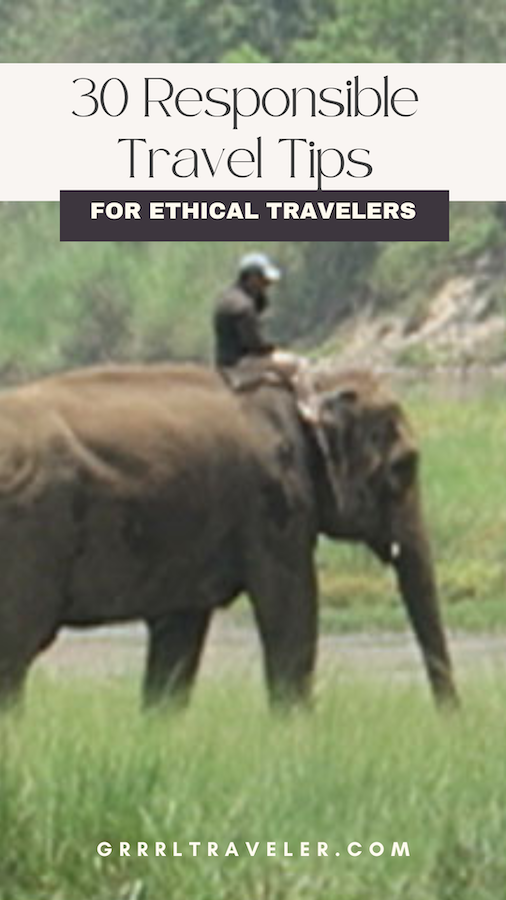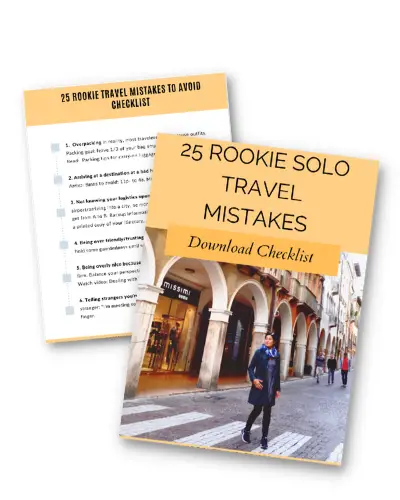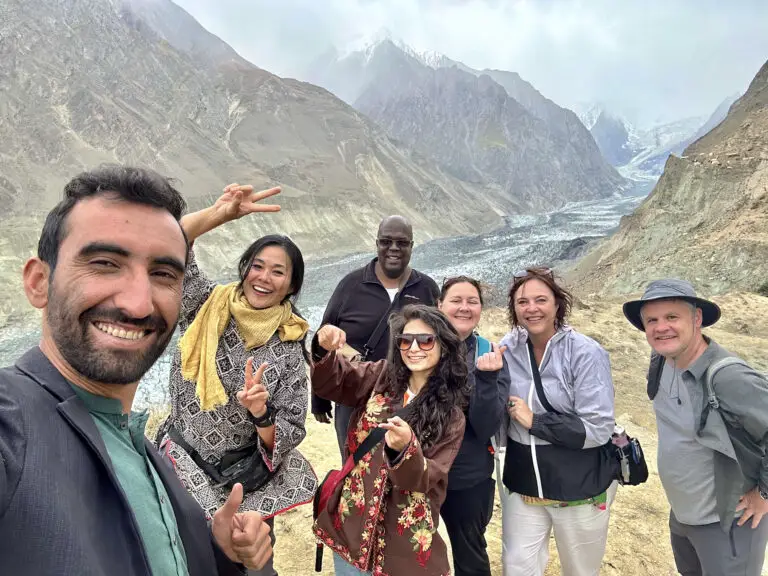Last Updated on January 10, 2024 by Christine Kaaloa
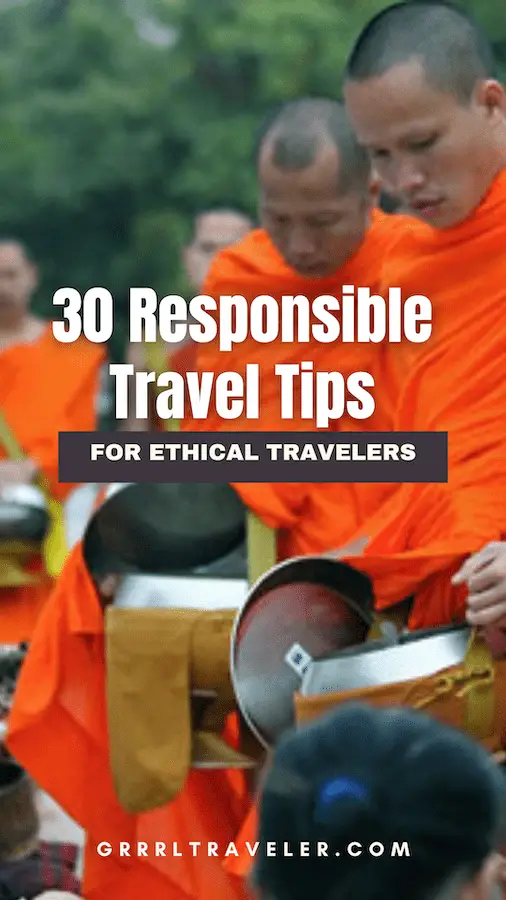
I put this responsible travel guide together to share responsible travel tips for the ethical traveler. If you took away one tip and practiced it or you shared this post with friends, you are helping alleviate the ongoing negative impact that tourism brings. I am continually furthering my growth in this department so please share your responsible tips as well.
Crowds, over-tourism, human zoos, animal/marine life abuse in the name of tourist entertainment, and the overburdening of natural resources… there are days I have a hard time feeling proud to be a traveler or travel blogger.
Traveling is one of the most enriching experiences in life. It allows us to explore new cultures, meet new people, and see some of the world’s most beautiful sights. However, as travelers, we also have a responsibility to ensure that our actions do not contribute to the negative impact that tourism brings upon destinations. Here’s some responsible travel practices to be mindful of on your next trip!
Read 14 Eco-friendly tips for Ethical Travel
Responsible Travel Tips for the Ethical Traveler
Table of Contents: 30 Responsible Travel Tips for Ethical Travelers
- 1 Responsible Travel Tips for the Ethical Traveler
- 1.1 Respecting Culture & Community
- 1.2 Wildlife tourism
- 1.2.1 9. AVOID animal tourism
- 1.2.2 10. Appreciate wildlife in the wild
- 1.2.3 11. Rule of thumb is: If you can feed, pet, bathe or take selfies with the animal, it is exploitation,
- 1.2.4 12. Respect local wildlife
- 1.2.5 13. Do not buy products made from endangered animals
- 1.2.6 14. Support conservation efforts
- 1.3 Supporting Local Economies
- 1.3.1 15. Support local businesses
- 1.3.2 16. Shop Locally
- 1.3.3 17. Engage with the local community
- 1.3.4 18. Eat street food
- 1.3.5 18. Pay a fair price
- 1.3.6 19. Volunteering
- 1.3.7 20. Hire licensed guides
- 1.3.8 21. Avoid giving money to begging children.
- 1.3.9 22. Avoid “volunteerism” tours with orphanages
- 1.4 Support Environmental Health
- 1.4.1 23. Bring a reusable water bottle
- 1.4.2 24. Use coral or reef-safe sunscreen with beach activities
- 1.4.3 25. Collect your trash when leaving
- 1.4.4 26. Homestay and Green hotels
- 1.4.5 27. Reduce water usage
- 1.4.6 28. Conserve energy
- 1.4.7 29. Support eco-friendly tours
- 1.4.8 30. Choose sustainable transportation
- 1.4.9 Conclusion
1. Research responsible and sustainable tour operators
Responsible tour operators want you to enjoy an authentic experience in an ethical way that does not burden, disrespect or exploit a destination, community or natural environment.
Sustainable operators build ethical and authentic relationships with local, indigenous and marginalized communities in an effort to bridge a traveler with an insightful and meaningful cultural experience, that also empowers the local community with a means of business income and sustainability. A sustainable operator will not exploit a culture or advertise the experience as if it were a human zoo.
Ethical tour operators can go under different keyword descriptions: “responsible travel”, “sustainable travel”, “ethical travel”, “conscious travel”, “regenerative travel”. Often, they’ll have a statement about their operational ethics on their website.
2. Research ethical tour operators before booking
Research sustainable and responsible tour operators when you book your tours. Although the list of ethical tour operators is still limited, it’s a growing industry. Sometimes, you can spot a responsible tour operator by their website. You can google reviews on the tour company as well.
I google “responsible tour operator” + (city name) to see if there are ethical operators in the city I’m traveling. If I’m working with a tourism board, I’ll request recommendations on ethical operators should they have any.
Intrepid Travel has a long-standing reputation for running responsible tours and working with responsible local tour operators. But sometimes you just want a day tour.
3. If it’s a “cheap tour”, proceed with caution.
It’s tempting to book your tour or activity with the cheapest tour agent you can find, but “cheap” are the worst offenders, when it comes to exploiting marginalized communities and animal labor/abuse. Most “cheap tour” companies are unethical, but you’ll find many camped out in this category. These businesses sell bucket list experiences that can sound like you’ll be visiting a three ring circus, but because they’re so cheap, they need to sell a lot of tours to make it worthwhile. That means any activity they are selling is overburdened with tourists.
“take photos with a tiger”= drugged and chemically sedated tigers (here are Tiger Kindom articles and a blog
“ride an elephant” = stir-crazy, mistreated and broken elephants (if in Thailand – which is synonymous, here are ethical hands-off options)
“visit a village tribe” = human zoo selling souvenir trinkets
The bottom line is “exploitation” of the human and animal kind. Budget day tours in Thailand are infamous for this! Click on this GetyourGuide page for Thailand tours and you’ll see how many activities feature elephants! The Thailand Tourism board finally wrote this blog post about things not to do in Thailand. Note: If you’re riding touching, bathing or interacting with an animal, it is not an ethical sanctuary or tour.If the activity is a trip to a Karen longneck tribe village – sometimes local tours sneak this in as a sensational attraction– it is basically, a human zoo of sitting for photos as tourists snap away at their long decorated necks! I am all for visiting ethnic and marginalized communities but it’s only helpful to them when your tourist dollars actually go to their community.
Respecting Culture & Community
4. Respect the local etiquette
Before traveling to a new culture, research their traditions and etiquette. Be mindful and respectful of their customs. Some cultures are highly conservative and wearing revealing clothes can be offensive or put you in a sexually loose light. Observe religious and cultural etiquette of entering temples, churches, and local homes. In cultures like Korea, there are customs with seniority or accepting gifts with both hands. In Thailand, you do not want to point your feet at the Buddha.
5. Dress appropriately
I like to dress to respect cultural dress codes. This means that I research the cultural etiquette in advance before packing my wardrobe. If a culture is a conservative, there are clothes I know to avoid such as spaghetti tank tops or short skirts. When visiting religious sites always dress respectfully.
6. Ask permission before taking photos of locals.
Before taking that snap of a local, ask permission first. Some locals do not appreciate it. Get to know the person you’re taking a photo of first or share a cultural interaction with them, buy sending them their photo or letting them look at the photo you’ve taken.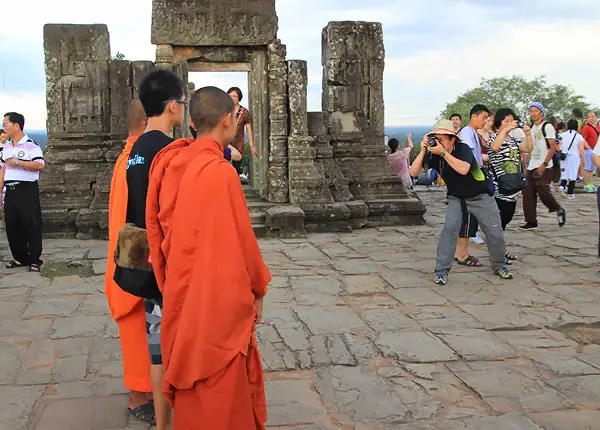
7. Respect local communities
Be respectful of the local communities and their way of life. Avoid disrupting their daily routines or being intrusive. In Laos, I witnessed tourists flock to take photos of monks taking alms. Some jumped in front of them with camera flashes as the monks solemnly walked in their procession accepting food from locals.
Photo tips: Avoid impeding a local’s daily life and work. Turn off your flashes in temples and when locals are participating in a religious event. Use a zoom lens or your automatic camera zoom to get in close.
Read What to pack for filming a Safari
8. Avoid treating ethnic minorities like a human zoo
You might be visiting a village or minority culture in which the locals are dressed in traditional clothing. Minority cultures are often treated callously as human zoos.
Ethnic minorities are not often respected in the countries which they settle in- Thailand, Myanmar, Laos, etc… In Thailand, Thai tour operators treat Karen longneck village visits like human zoos. They allow tourists to treat the villagers disrespectfully for shock value, because you are there to see their long necks, which is a symbol of beauty for the villagers. It’s really sad to see these local villagers sit passively for frenzied tourists, who snap photos of them and then in the next turn, blow them off with a huff when the longneck tribe desperately attempts to sell trinket souvenirs. Often they are not being paid much by the operators, if anything at all! But they allow this invasion and cultural disrespect for the opportunity to sell their wares and make an income. Although I was naive and enthralled at the time, there was something very disturbing and sad about both situations. My participation in that form of entertainment felt wrong, because it was.
Today, I am very wary of tribal visits unless it is through a responsible tour operator who I know is paying a fair wage and has established an ethical trade where travelers are educated on how to respect indigenous cultures.
Poverty tourism is another thing to watch out for. While it may seem kind hearted and tempting to see inside a slum, it’s not respectful or honoring to its residents. Even the poor have pride. If you do participate in this, research how much of the money goes towards local empowerment and a sustainable program to get local businesses on their feet. Make sure that children arent used as guides, as this keeps them from going to school.

Wildlife tourism
9. AVOID animal tourism
Refrain from participating in activities that exploit animals, such as elephant rides or visiting animal shows. These practices often involve cruelty and mistreatment.
If you really want to do a desert safari and there are camel rides and camel carts, consider walking instead. Simple rules regarding animal interaction: do not pet, ride, touch, feed animals or marine life. In the past, I was quite naive about animal rides- I’ve ridden an elephant and camel thinking it was an exotic bucket list thing to check off my list. But that was before I truly recognized how these animals were being mistreated. Many of them look worn, go stir crazy, are separated from their offspring or worse, the offspring is made to work alongside them! These sad beasts are driven hard to meet the demands of the tourist dollar and vainglorious selfies! The cheaper the cost of the activity, the more the owner/company must overwork the animal to make profits. It’s not a good vibe kinda feeling.
There are several arguments which tell you that these animals are happy working, are authentic to the culture and help pay for the livelihood of poor families and their cost of being maintained and fed, but at the day’s end, they are captive, broken and overworked to do work for humans. Your tourist dollars support and vote for the continuation of their slavery.
Wildlife deserves to live wild, royal and free. These animals are royal beings with their own life.
Please consider this.
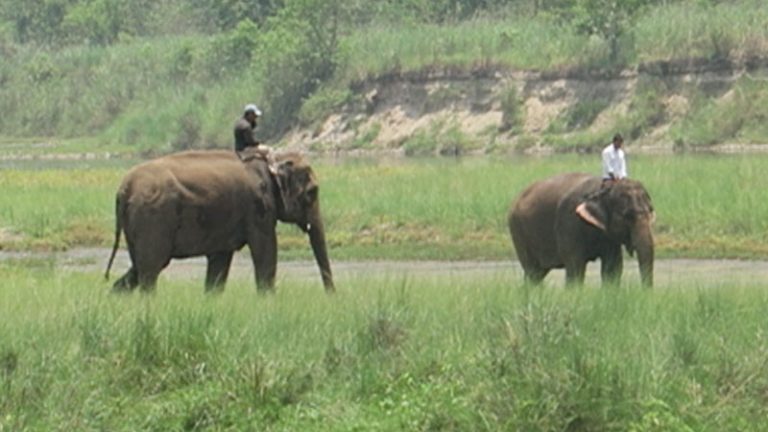
10. Appreciate wildlife in the wild
We all have expectations to see what is on our bucketlist. Many travelers want a guaranteed animal/marine life sightings on their excursions. Due to that pressure, unethical operators resort to tampering with nature to provide those results they’re reliant upon for their business.
Responsible operators and naturalists on the other hand, study animal/marine life behavior to know where natural habitats are and how travelers can appreciate without disturbing them. They aren’t results-focused but can still provide value if there is no sighting.
Animal lovers should consider booking activities which allow animals their freedom in the wild. Safaris are one way to enjoy a hands-off experience observing wildlife roam freely in their natural habitat.

11. Rule of thumb is: If you can feed, pet, bathe or take selfies with the animal, it is exploitation,
“If tourists stopped paying money for it, it would change the entertainment.”– Jane Goodall.
Before booking a wildlife activity, ensure you conduct thorough research. You don’t want your enjoyment to come at the expense of endangering species or harming wildlife.
When you choose not to support attractions that exploit animals, owners are compelled to seek alternative ways to generate revenue. Some argue that animals need to work so their owners can afford to care for and feed them. However, there is no evidence that owners are currently providing proper care. There is only a guarantee that the cycle of abuse will persist. When owners and fake sanctuaries can no longer profit from overworking their animals, they are left with no choice but to find alternative means of survival and may need to surrender the animal.
These days, elephant camps use the word sanctuaries, to evade the fact they are for-profit organizations, exploiting these gentle beasts by promising guest interaction with them. The rule of thumb is: if you can feed, pet, bathe or take selfies with the animal, it is not rescuing but exploitation. You are subjecting the animal to work for your tourist dollars.
Read wildlife tips for the ethical traveler
12. Respect local wildlife
When exploring natural habitats, demonstrate respect for the wildlife and their surroundings. Avoid disturbing or harming the animals and refrain from feeding them human food, junk food, or snacks. Additionally, be sure to remove any waste, such as plastics, napkins, soda bottles, etc., from their habitats.
13. Do not buy products made from endangered animals
Avoid purchasing products and crafts made from endangered or protected animals. Just because these items are for sale does not mean you should buy them. Your financial support sustains illegal and harmful activities.
14. Support conservation efforts
Look for ways to support local conservation initiatives, such as volunteering to do beach or city cleanups. You can find these volunteer groups on Facebook groups or you can do your own beach cleanup, by removing trash where you find it.
Read 14 Eco-friendly tips for Ethical Travel
Supporting Local Economies
15. Support local businesses
Instead of eating at chain restaurants, seek out family-owned eateries and mom-and-pop shops. This will not only support the local economy but also provide you with a more authentic travel experience. During a trip to San Juan, I asked the receptionist at my hotel for recommendations on where to find an authentic Puerto Rican food experience. Initially, the receptionist suggested a popular touristy restaurant that was quite expensive. I explained that I was looking for something “moderately-priced, popular with locals, and family-run“. The receptionist then directed me to a small restaurant owned and operated by their friend’s family. The food there was incredibly authentic and delicious, and I observed both locals and tourists enjoying their meals.
16. Shop Locally
When it comes to shopping, opt for local markets, grocery stores, mom-and-pop shops, and small boutiques. Purchase handicrafts from indigenous communities and artwork from local artisans.
By shopping locally, you not only empower the local economy but also contribute to a more sustainable travel experience. It’s best to avoid big international chains, as your money tends to flow out of the local community and sometimes, out the country. While it can be tempting to visit familiar chains like McDonald’s or Starbucks for a taste of home, remember that these big corporations can often undermine local businesses and communities.

17. Engage with the local community
Interacting with the local community is an enriching aspect of solo travel. Take time to engage with locals, learn about their culture, and show respect for their traditions (see my experience of taking photos in developing countries). You can participate in local events, attend cultural festivals, or even strike up conversations with residents. By immersing yourself in the local community, you gain a deeper understanding of the destination and foster meaningful connections.
18. Eat street food
Eating street food is an excellent way to support local communities. Street food vendors are often independent businesses, so your money goes directly towards supporting their business, family, and community.
According to Wiego.org, “street vendors create jobs not only for themselves but also for porters, security guards, transport operators, storage providers, and others. They contribute to the city’s revenue through license and permit fees, fines, and various taxes.”
Tip: Keep in mind that street vendors often make very little profit. In some countries, they earn only a few cents per dish. To support them further, avoid asking for extra napkins or packaging as these add to their operational costs. If you want takeaway food, bring a ziplock bag, and carry extra tissues with you to clean up after yourself.
Read food safety tips to avoid getting sick
18. Pay a fair price
While it’s natural to seek a good deal when shopping, it’s important to avoid hard haggling and bargaining that may prevent vendors from making a reasonable profit. Never compromise someone’s hard work or livelihood for the sake of a discount.
19. Volunteering
Give back to the local community by volunteering or donating to verified local charities. Community volunteering projects such as building a house, volunteering time at a local animal shelter or doing beach and hiking trail cleanups are short term and easy to do. Most volunteer programs require weeks to months of committed volunteering, but there may be short term programs that are harmless to the recipients.
Longer term volunteer projects can be WOOFing, Peace Boat, Peace Corps.
20. Hire licensed guides
Although it may be tempting to hire local children as guides to support them financially, it’s crucial to respect the laws and regulations of each country. Official guides have undergone legal training, certification, and personal investment in their profession.
For instance, during my visit to India, I made the mistake of hiring an unlicensed guide who took me to potentially unsafe locations. In India, licensed guides are required to invest in their education and obtain licenses to guide at specific monuments. Similarly, in Morocco, my girlfriend and I hired a teenage boy as a guide, unknowingly causing him to evade police and licensed guides. We later learned that our actions jeopardized his education and future as if caught, he would end up in jail.
21. Avoid giving money to begging children.
Freely giving money to child beggars perpetuates a cycle that keeps children out of school and subjects them to street life. Instead, consider donating to verified nonprofit organizations like the Salvation Army that you trust and follow on social media.
22. Avoid “volunteerism” tours with orphanages
There are many voluntourism tours that offer visits to schools or orphanages, but it’s important to recognize that such visits can disrupt children’s learning time. As a former teacher, I know that there is little learning that can be done in such a short period of time. It takes months for children to truly learn from lessons. Additionally, children are to be handled sensitively, especially considering there are sexual predators out there. Any adults who handle or interact with children should be going through background checks; overall, any activities promising interaction with children- who are not your own- are not ethical operators. If any tour company sells you this type of experience, avoid it at all costs.
Support Environmental Health
23. Bring a reusable water bottle
Bring reusable water bottles during your travels. I always ensure to bring a reusable bottle to the airport, as many airports provide water refilling stations for passengers with their own containers.When I happen to buy a water bottle on my trip, I reuse it several times to make sure I’ve gotten a good use from it before discarding. I’ve reused my plastic water bottle for entire trips.
Tip: These days, I buy Pathwater– it’s actually 9.5 PH balanced water with electrolytes, but it comes in a light-weight, wide-mouth design for easy refilling, and easy to care for. Just hand-wash or shake with a few drops of dish soap and warm water, then rinse. Alternate options are: Nomader Collapsable water bottle or a Hydroflask Wide mouthed bottle
24. Use coral or reef-safe sunscreen with beach activities
Opt for coral or reef-safe sunscreen during beach activities.
Read my Ultimate coral-safe sunscreen guide with recommendations.
25. Collect your trash when leaving
Always be mindful of your waste and dispose of it in designated areas. Avoid littering and prioritize recycling whenever possible.
If you don’t see a nearby trash can, carry your trash in a paper bag until you find an appropriate place to dispose of it.
26. Homestay and Green hotels
Choose accommodations that prioritize sustainability and have implemented eco-friendly practices. Look for places that use renewable energy, recycle, minimize water usage, and have energy-efficient appliances like televisions and air conditioning.
Supporting sustainable accommodations can involve staying at family-run guesthouses, local bed and breakfasts, or traditional homestay.
“Green hotels” focus on maintaining an environmentally conscious establishment with minimal plastic waste. Some may even have sustainable practices, such as sourcing food from their own gardens.
27. Reduce water usage
Be mindful of your water consumption and try to minimize it whenever possible. Take shorter showers, turn off the tap while brushing your teeth, and reuse towels.
28. Conserve energy
When leaving your accommodation, remember to turn off lights, air conditioning, and other electronics to conserve energy.
29. Support eco-friendly tours
Consider engaging in human-powered activities such as biking, kayaking, or walking tours. These not only offer a unique perspective for sightseeing but also contribute to a more sustainable travel experience. Personally, I enjoy food tours that incorporate walking, allowing me to explore the local cuisine, burn calories, and connect with the community.
30. Choose sustainable transportation
Embrace walking, biking, electric scooter rentals or using public transportation options. This helps reduce your carbon footprint, supports local businesses, and provides opportunities to interact with locals, fostering a deeper sense of integration with the local community.
Conclusion
By incorporating these tips into your solo travel experience, you can enhance your journey while also being a responsible and ethical traveler. Responsible tourism is about minimizing our negative impact, respecting local cultures, and supporting sustainable practices. Let’s strive to leave a positive footprint as we traverse the world.
Recommended Trip Planning Services:
Travel with me and join me on my next group adventure!
Getyourguide is my favorite tour booking site. Find everything from food tours, city sightseeing discounts, SIM cards and more
Discover Cars finds the best car rental price quote.
Booking Yoga Retreats – a huge directory of yoga, surfing, meditation retreats around the globe.
Skyroam– Global wifi (take 10% off with my referral code GRRRLTRAVLER)
Booking.com who I book accommodations with
World Nomads trip insurance that covers my adventure style in travel.
Download your free customizable trip packing checklist
Share your responsible travel tips below! What are responsible travel practices you’d recommend?

